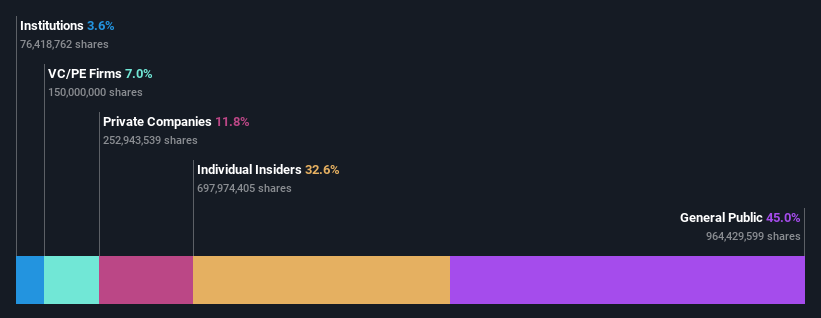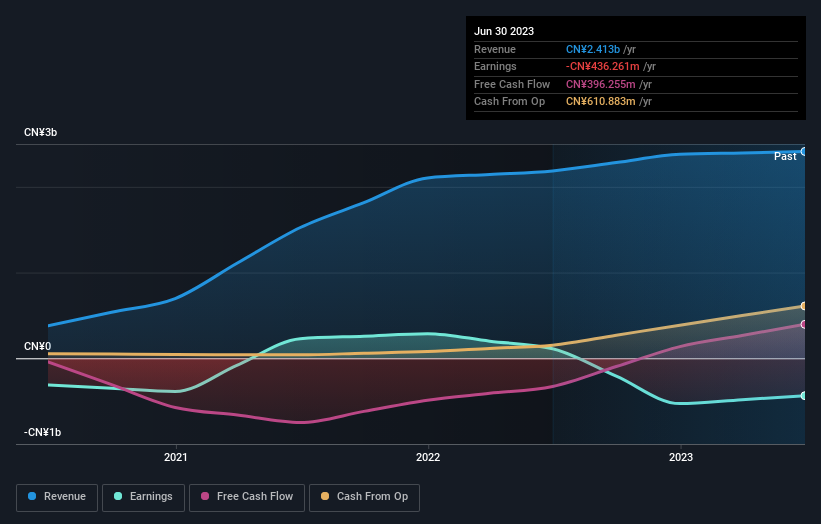Stock Analysis
- Hong Kong
- /
- Life Sciences
- /
- SEHK:1873
Viva Biotech Holdings' (HKG:1873) market cap up HK$193m last week, benefiting both individual investors who own 45% as well as insiders

Key Insights
- Viva Biotech Holdings' significant individual investors ownership suggests that the key decisions are influenced by shareholders from the larger public
- The top 9 shareholders own 50% of the company
- Insider ownership in Viva Biotech Holdings is 33%
A look at the shareholders of Viva Biotech Holdings (HKG:1873) can tell us which group is most powerful. And the group that holds the biggest piece of the pie are individual investors with 45% ownership. Put another way, the group faces the maximum upside potential (or downside risk).
While individual investors were the group that reaped the most benefits after last week’s 17% price gain, insiders also received a 33% cut.
In the chart below, we zoom in on the different ownership groups of Viva Biotech Holdings.
Check out our latest analysis for Viva Biotech Holdings

What Does The Institutional Ownership Tell Us About Viva Biotech Holdings?
Many institutions measure their performance against an index that approximates the local market. So they usually pay more attention to companies that are included in major indices.
Since institutions own only a small portion of Viva Biotech Holdings, many may not have spent much time considering the stock. But it's clear that some have; and they liked it enough to buy in. So if the company itself can improve over time, we may well see more institutional buyers in the future. It is not uncommon to see a big share price rise if multiple institutional investors are trying to buy into a stock at the same time. So check out the historic earnings trajectory, below, but keep in mind it's the future that counts most.

Hedge funds don't have many shares in Viva Biotech Holdings. Jiong Wu is currently the largest shareholder, with 10% of shares outstanding. For context, the second largest shareholder holds about 8.7% of the shares outstanding, followed by an ownership of 7.0% by the third-largest shareholder. Chen Cheney Mao, who is the second-largest shareholder, also happens to hold the title of Chief Executive Officer.
We also observed that the top 9 shareholders account for more than half of the share register, with a few smaller shareholders to balance the interests of the larger ones to a certain extent.
While it makes sense to study institutional ownership data for a company, it also makes sense to study analyst sentiments to know which way the wind is blowing. As far as we can tell there isn't analyst coverage of the company, so it is probably flying under the radar.
Insider Ownership Of Viva Biotech Holdings
While the precise definition of an insider can be subjective, almost everyone considers board members to be insiders. The company management answer to the board and the latter should represent the interests of shareholders. Notably, sometimes top-level managers are on the board themselves.
Insider ownership is positive when it signals leadership are thinking like the true owners of the company. However, high insider ownership can also give immense power to a small group within the company. This can be negative in some circumstances.
Our information suggests that insiders maintain a significant holding in Viva Biotech Holdings. Insiders have a HK$440m stake in this HK$1.3b business. We would say this shows alignment with shareholders, but it is worth noting that the company is still quite small; some insiders may have founded the business. You can click here to see if those insiders have been buying or selling.
General Public Ownership
The general public, who are usually individual investors, hold a 45% stake in Viva Biotech Holdings. While this size of ownership may not be enough to sway a policy decision in their favour, they can still make a collective impact on company policies.
Private Equity Ownership
With an ownership of 7.0%, private equity firms are in a position to play a role in shaping corporate strategy with a focus on value creation. Some investors might be encouraged by this, since private equity are sometimes able to encourage strategies that help the market see the value in the company. Alternatively, those holders might be exiting the investment after taking it public.
Private Company Ownership
Our data indicates that Private Companies hold 12%, of the company's shares. Private companies may be related parties. Sometimes insiders have an interest in a public company through a holding in a private company, rather than in their own capacity as an individual. While it's hard to draw any broad stroke conclusions, it is worth noting as an area for further research.
Next Steps:
While it is well worth considering the different groups that own a company, there are other factors that are even more important. For instance, we've identified 3 warning signs for Viva Biotech Holdings (1 is a bit unpleasant) that you should be aware of.
Of course this may not be the best stock to buy. So take a peek at this free free list of interesting companies.
NB: Figures in this article are calculated using data from the last twelve months, which refer to the 12-month period ending on the last date of the month the financial statement is dated. This may not be consistent with full year annual report figures.
Valuation is complex, but we're helping make it simple.
Find out whether Viva Biotech Holdings is potentially over or undervalued by checking out our comprehensive analysis, which includes fair value estimates, risks and warnings, dividends, insider transactions and financial health.
View the Free AnalysisHave feedback on this article? Concerned about the content? Get in touch with us directly. Alternatively, email editorial-team (at) simplywallst.com.
This article by Simply Wall St is general in nature. We provide commentary based on historical data and analyst forecasts only using an unbiased methodology and our articles are not intended to be financial advice. It does not constitute a recommendation to buy or sell any stock, and does not take account of your objectives, or your financial situation. We aim to bring you long-term focused analysis driven by fundamental data. Note that our analysis may not factor in the latest price-sensitive company announcements or qualitative material. Simply Wall St has no position in any stocks mentioned.
About SEHK:1873
Viva Biotech Holdings
Viva Biotech Holdings, an investment holding company, provides structure-based drug discovery services to biotechnology and pharmaceutical customers worldwide.
Mediocre balance sheet and slightly overvalued.

